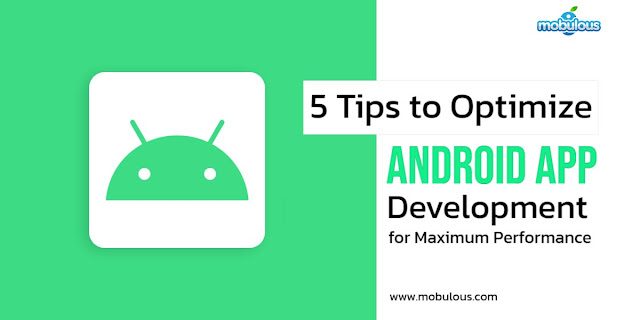In today's highly competitive mobile app market, optimizing Android app development
is crucial to ensure high performance, user satisfaction, and app
success. With millions of apps available, standing out requires more than
just functionality; it demands efficiency and excellence in performance. Below,
we delve into five proven tips to enhance the performance of Android
applications and ensure they operate seamlessly in a crowded marketplace.
Read Our Latest Blog’s:
- · The Best Programming Languages for iOS App Development in 2024
- · 13 Best iOS App Development Tools for Beginners in 2024
- · Top Programming Languages for Android App Development in 2024
- · Top SwiftUI Libraries for iPhone App Development in 2024
Implement Efficient Code Practices
Efficient code is the backbone of any well-performing
Android app. To maximize performance, developers must focus on writing clean,
efficient code that avoids unnecessary operations and minimizes resource
consumption. Here are several practices to follow:
- Optimize
Algorithms: Utilize efficient algorithms and data structures to
minimize execution time and resource usage. Avoid complex algorithms that
may cause slow performance.
- Minimize
UI Thread Operations: Offload intensive tasks from the UI thread to
background threads. Use AsyncTask, HandlerThread, or ExecutorService to
perform background operations.
- Avoid
Memory Leaks: Use tools like Android Profiler and LeakCanary to detect
and fix memory leaks. Leaks can lead to decreased performance and
application crashes.
Leverage Android's Performance Tools
Android provides a suite of performance analysis tools
to help developers monitor and improve app performance. Utilizing these tools
can provide deep insights into the app's behavior and help identify performance
bottlenecks. Key tools include:
- Android
Profiler: Integrated into Android Studio, this tool helps monitor CPU,
memory, and network usage in real time. Analyze performance metrics to
identify and resolve issues.
- GPU
Profiler: Use this to analyze and optimize graphical rendering
performance. This tool helps ensure smooth animations and high frame
rates.
- Systrace:
Capture detailed timing information for your app’s processes to understand
and optimize the app's performance.
Optimize Network Operations
Efficient network operations are crucial for reducing
latency and improving the user experience. Consider the following strategies to
optimize network performance:
- Use
Caching: Implement caching strategies to minimize redundant network
requests. Utilize libraries like Retrofit with OkHttp for efficient
caching and network management.
- Reduce
Data Transfer: Compress data to reduce the amount of data transferred
between the server and the app. Use formats like JSON or Protocol Buffers
for compact data representation.
- Optimize
API Calls: Batch API requests where possible and avoid excessive or
unnecessary calls. Implement efficient request strategies to minimize the
impact on performance.
Enhance User Interface and Experience
A smooth and responsive user interface (UI) is vital for
maintaining user engagement and satisfaction. Focus on optimizing the UI to
ensure a seamless experience:
- Minimize
Layout Overdraw: Use tools like Layout Inspector to detect and reduce
overdraw in your app's UI. Excessive overdraw can lead to performance
issues and increased power consumption.
- Optimize
Images and Graphics: Compress and scale images appropriately to reduce
memory usage and improve load times. Use vector graphics where possible
for better scalability and performance.
- Implement
Smooth Animations: Use Property Animation or Motion Layout for smooth,
fluid animations. Avoid using excessive or complex animations that may
impact performance.
Regularly Test and Update Your App
Continuous testing and updates are essential for maintaining
optimal performance. Implement a robust testing and maintenance strategy to
ensure your app remains performant over time:
- Automated
Testing: Use automated tests to regularly check app performance across
different devices and scenarios. Employ tools like Espresso for UI testing
and JUnit for unit testing.
- User
Feedback: Collect and analyze user feedback to identify performance
issues and areas for improvement. Address common complaints and
suggestions in updates.
- Stay
Updated: Regularly update your app to leverage the latest Android SDK
features and improvements. Address known issues and incorporate
performance enhancements in each release.
Conclusion:
By implementing these five tips, developers can
significantly improve the performance of their Android apps, leading to better
user experiences and higher app ratings. Continuously monitor, test, and
optimize your app to stay ahead in the competitive landscape and ensure
sustained success.

To further boost your app’s visibility, it’s essential to implement smart marketing strategies. Utilizing the Top Dofollow Social Bookmarking Sites List 2024 with High DA helps generate quality backlinks, improving your app’s SEO and organic reach. This can drive more downloads and engagement, giving your app a competitive edge in the market.
ReplyDeletePost a Comment